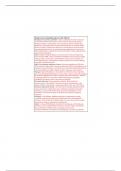Drugs to know (including adverse/side effects):
Nitroglycerine (nitrostat, nitrobid)- Causes vasodilation of vessels to decrease
work of heart muscle and decreases venous return to decrease the preload.
Headache, dizziness, hypotension. Can use Aspirin to relieve headache pain.
Monitor for reflex tachycardia and treat with beta-blocker or calcium-channel
blocker if needed. Tolerance can develop so it is important to use long-acting
nitro intermittently (at least 10-12 hours between applications). Can increase
intracranial pressure so should not be used with anemia, closed-angle glaucoma,
and traumatic head injury.
Niacin- Lipid-lowering medication. Causes decrease in LDL and triglyceride
levels. Increases HDL. Causes vasodilation. Flushing reaction, burning, itching,
tingling, redness of face/chest, and headaches. Increases uric acid level. Can
cause hepatotoxicity, stomach ulcers, changes to glucose level, muscle damage,
lowers BP, and abdominal pain.
HMG-COA reductase inhibitors (Crestor)- Decrease manufacture of LDL and
VLDL and lower triglycerides. Increase manufacture of HDL. contraindication for
pregnant women/liver disease/ and alcohol use. Life threatening rhabdomyolysis
and renal insufficiency/failure. Hepatic toxicity. Pregnancy risk category X.
Glucagon- Raises blood glucose. Turn patient on left side to reduce aspiration
risk. Given through IM/subcutaneous. Given when a patient cannot take anything
by mouth for hypoglycemia ( under 70 mg/dL). May cause GI distress. Monitor
for hyperglycemia ( dry, warm skin, fruity breath, polyuria, polyphagia,
polydipsia) when glucose level is more than 125 6mg/dL.
Noroxin(norfloxacin)- Fluoroquinolone antibiotic. Bactericidal and
broad-spectrum. UTI antibiotic. May cause GI upset, suprainfection, renal
toxicity, achilles tendon rupture, and photosensitivity. May cause CNS effects.
Hormone replacement therapy - increased risk for estrogen-dependent breast
cancer and cervical/ endometrial cancer (administer progestins along with
estrogens) , increased risk for MI, stroke, and venous thrombosis w/ risk
increased by concurrent smoking. Avoid all nicotine products. Pregnancy
category X.
Lisinopril - ACE-inhibitor. Inhibits production of angiotensin II causing
vasodilation and increased excretion of sodium and water with potassium
retention. 1st line treatment for hypertension. Can cause dry persistent cough,
hypotension, dizziness, angioedema, hyperkalemia,.
Aspirin - increased bleeding risk, stomach ulcers, dyspepsia, abdominal pain,
heartburn, nausea, impaired kidney function ( decrease output), and tinnitus.
Reyes syndrome in children when used aspirin is used to treat
chickenpox/influenza. Treatment for niacin flushing, and nitrate’s headaches.
, Inhaled Epinephrine - acute asthma exacerbations, tachycardia, headache,
nervousness, shaking, stomach upset, dry mouth, trouble sleeping
Travoprost (Travatan) - glaucoma medication that decreases intraocular pressure,
prostaglandin analog, eye drops may cause temporary burning, redness, and
blurry vision upon instillation, may cause iris to darken. Decrease IOP by
increasing aqueous humor outflow. Topical first line medication for pt with ocular
hypertension, poag ( open angle glaucoma). Inform pt about possible bulging
ocular blood pressure, increase pigmentation ( brown on iris), it could cause
conjuntiva, migraine, blurred vision, and stinging. (Report to provider if migraine
occu). Pregnancy risk C.




